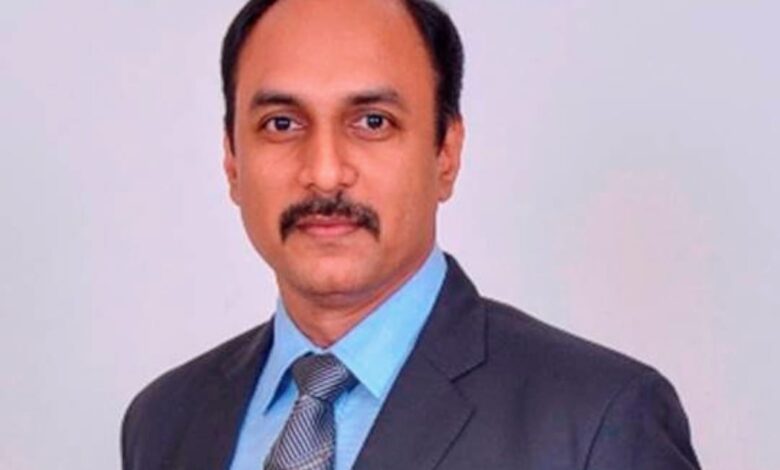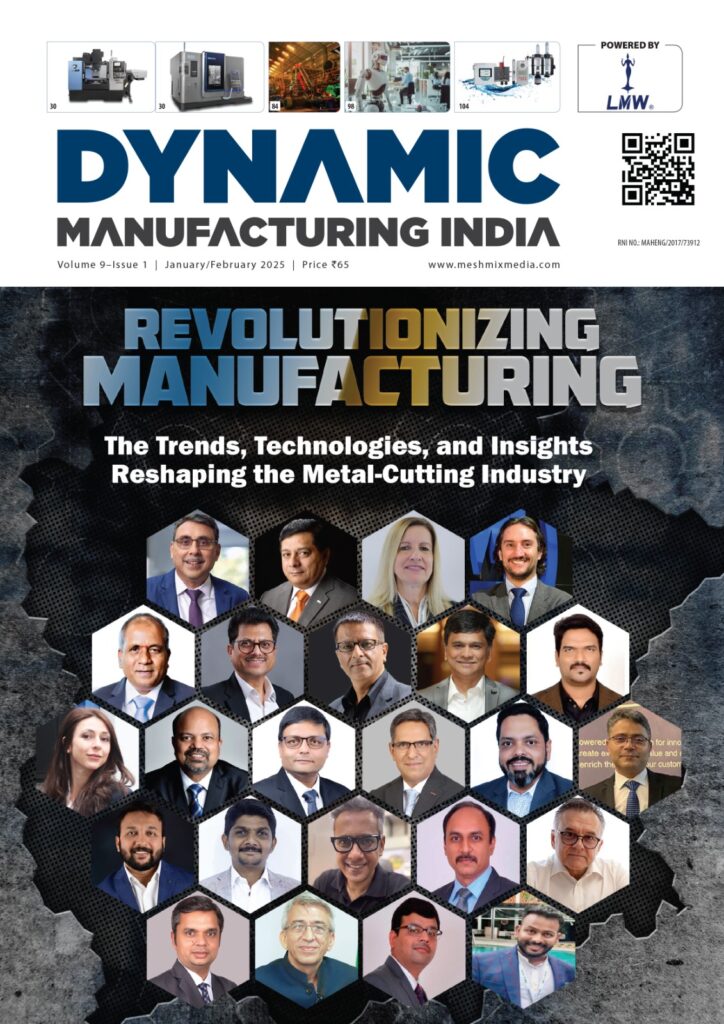Redefining the Future
Sunil Joshi, President of Sandvik Coromant India, delves into transformative advancements, sustainable manufacturing initiatives, and the evolving skillsets shaping the metal-cutting industry.

- What recent advancements in metal-cutting technology have had the most transformative impact on efficiency and precision?
Recent advancements in metal-cutting technology, such as digital machining tools and advanced carbide grades, have revolutionised the manufacturing landscape. Digital tools enable real-time monitoring and data analysis, optimising cutting processes for maximum efficiency and minimal downtime. Advanced carbide grades are engineered for durability and precision, allowing tools to perform reliably at higher speeds and with greater resistance to wear, even when cutting harder materials.
Additionally, innovations in tool geometries and coatings contribute to smoother chip removal and reduced heat generation, enabling faster cutting speeds and enhanced tool life. Process monitoring software provides insights into machine performance, enabling operators to adjust cutting parameters dynamically, minimising waste and ensuring consistent finish quality. Together, these advancements not only increase productivity but also align with sustainability goals by reducing energy consumption, extending tool life and lowering the cost per part produced.
- How is the industry adapting to sustainable manufacturing practices, and what specific initiatives are helping to reduce environmental impact?
The metal-cutting industry is embracing sustainable manufacturing through innovative practices aimed at reducing environmental impact. Sandvik Coromant, for instance, has introduced initiatives such as carbide recycling programs, where worn-out tools are collected, reprocessed and reused. Circularity efforts extend to reconditioning tools, which minimises material waste and promotes resource efficiency. Additionally, energy-efficient machining technologies and digital solutions help optimise production processes, reducing emissions and resource consumption. Collaborative efforts to integrate sustainable practices throughout supply chains are also becoming standard, advancing the industry’s overall environmental responsibility.
For manufacturers aiming to enhance sustainability, understanding the current performance of their production facilities is a crucial first step. Launched by Sandvik Coromant in 2024, the Sustainability Analyser exemplifies our commitment to sustainable manufacturing. This advanced tool not only measures carbon emissions and energy usage but also offers actionable insights, including energy cost savings and emission reduction strategies. By providing a precise, data-driven sustainability assessment, the analyser empowers manufacturers to make informed decisions and implement meaningful changes toward achieving net-zero goals.
- With digitalization reshaping manufacturing, what new skills are essential for today’s workforce, and how is the industry addressing the skills gap?
With digitalisation transforming manufacturing, the workforce requires new skills to adapt to technologies such as automation, artificial intelligence (AI) and data-driven systems. Essential skills include digital literacy, proficiency in data analysis and the ability to manage advanced manufacturing processes integrated with IoT and smart systems. Problem-solving and supply chain management are also increasingly vital as manufacturers aim to streamline operations and enhance efficiency.
Collaborative platforms and better knowledge-sharing systems are critical for upskilling expertise while ensuring operational continuity. It’s vital that new systems exist to make workers’ jobs easier, freeing up their time to focus on more complex tasks. Solutions such as Sandvik Coromant’s CoroPlus® suite of digital products were created with this exact focus. For instance, CoroPlus® Tool Supply integrates seamlessly into manufacturing operations, providing features like automated tool replenishment, real-time inventory tracking and cost analysis. These capabilities reduce manual oversight, allowing workers to focus on high-value tasks while gaining insights into tool usage and performance. In addition, CoroPlus® Tool Guide plays a vital role in addressing the manufacturing skills gap by simplifying tool selection and cutting data optimisation. This tool provides quick, accurate recommendations tailored to specific machining applications, making it easier for workers to choose the most effective cutting tools and parameters for their tasks.
- What trends are driving the current demand for metal-cutting solutions, and how do you foresee the industry adapting to these trends?
The current demand for metal-cutting solutions is being driven by trends emphasising advanced manufacturing, sustainability and the integration of digital technologies. Key drivers include the rise of electric vehicles (EVs), increased demand for precision components in aerospace and the need for energy-efficient machining in response to sustainability goals. For example, the EV industry is pushing for innovative cutting tools capable of working with lightweight but durable materials such as aluminium and composites.
Additionally, smart manufacturing technologies, such as cloud-based systems and IoT-enabled tools are transforming the industry. These innovations allow for predictive maintenance, optimisation of tool performance and reduced downtime, making operations more efficient and responsive to modern requirements.
The metal-cutting industry is adapting to key trends by focusing on optimising machining for new materials, improving productivity and reducing both costs and carbon footprints. As manufacturers increasingly work with advanced materials in sectors like aerospace, automotive and energy, the demand for specialised tools capable of handling these materials is growing.
- What do you view as the most significant challenges facing the metal-cutting industry today, and what steps is your organization taking to stay competitive?
The metal-cutting industry faces several significant challenges today, including the need to adapt to rapid technological advancements, manage the complexities of new materials, improve sustainability practices and address skills gaps within the workforce. One major hurdle is the increasing demand for higher precision and faster production times, driven by industries like aerospace, automotive and electronics, which require advanced machining technologies that can handle new, often harder and more complex materials.
In response, Sandvik Coromant’s Manufacturing Wellness philosophy is a comprehensive strategy designed to address the evolving challenges in modern manufacturing. This approach emphasises the interconnected goals of enhancing productivity, minimising waste and fostering sustainable practices. Rather than tackling these areas in isolation, it focuses on creating synergies between efficiency, environmental stewardship and operational excellence. For us, Manufacturing Wellness acts as a guiding principal in face of today’s industry challenges. Whether we are producing new products, improving our sustainability strategy or investigating new technologies, our brand mission acts as an anchoring point that helps us better understand where we are and where we desire to be.

E copy of the magazine – https://www.machineinsider.com/dynamic-manufacturing-india-jan-feb-2025-edition/


